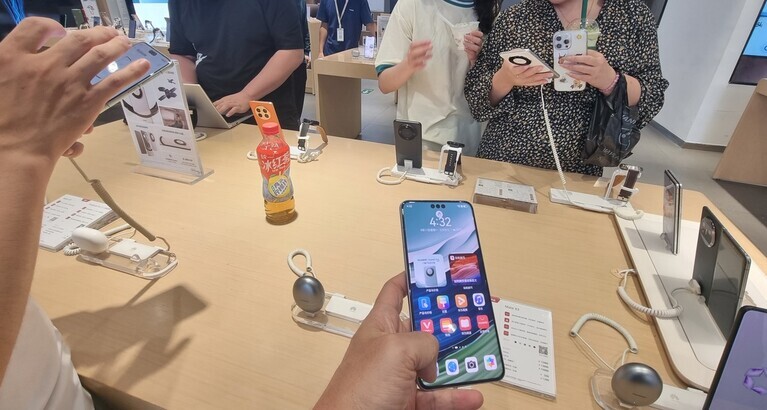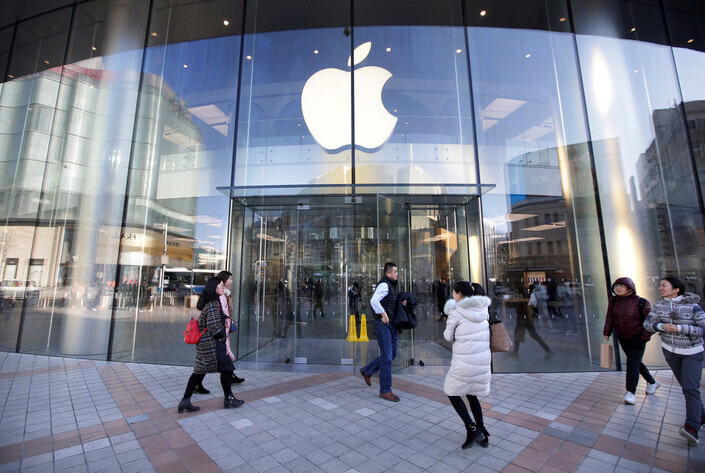hankyoreh
Links to other country sites 다른 나라 사이트 링크
[Reportage] Goodbye iPhone? Huawei’s latest model boosts local tech consumption in China

“We’re all sold out,” came the response of a clerk at a Huawei store in Beijing when I visited on Monday afternoon in search of the phone maker’s new high-performance Mate 60 Pro model.
“You’ll have to wait until the end of the month, so almost three weeks. But even then, there’s no guarantee they’ll be back in stock,” they told me.
Quite a few other shoppers had visited the store to purchase the Mate 60 Pro only to leave empty-handed after fidgeting for a while with the display phones.
One shopper, a woman in her 30s who currently uses an iPhone, told me that she’d recently switched to the Apple phone for the first time but found it “difficult to use since there are so many features that are hard to use in China.”
“I’m here checking things out because I’m thinking of switching to a Huawei next time,” she told me.
The launch of Huawei’s new smartphone has prompted many in China to ditch the iPhone for domestic products. With Apple unveiling its new iPhone 15 on Wednesday, it will be interesting to see if the recent “anti-iPhone” trend in China will stay.
Huawei’s surprise launch of the Mate 60 Pro late last month touched off this inclination toward using locally made smartphones over iPhones in China. Various media outlets reported that the new smartphone thwarted the US’ strict semiconductor restrictions against China, ushering in a movement to use homegrown products.
In addition, there has been a renewed emphasis on restrictions on iPhone use for Chinese civil servants.
“During a recent internal meeting, we were reminded of a protocol stating that we shouldn’t use iPhones. There was no check to see who was using iPhones, but the rule itself was mentioned during the meeting,” a civil servant based in Liaoning told the Hankyoreh.

It remains unclear when Chinese civil servants were barred from using iPhones, or if such a rule actually exists. It is estimated to have begun around 2020, when US sanctions on Huawei were in full swing.
Given that China is the largest producer of iPhones, the issue may have been off the radar for a while until the Wall Street Journal brought it back to the forefront last week.
In 2017, during its conflict with South Korea over the deployment of US THAAD anti-missile batteries, China quietly issued a ban on Korean cultural imports.
The “Huawei wave” is also trending online. On Weibo, a popular social media site in the country, a hashtag reading “return of Huawei, iPhone shipments drop by 10 million” was trending, with posts including the tag racking up more than 87 million views as of Tuesday morning.
One Chinese commenter wrote on Weibo, “US sanctions have hurt Huawei smartphones, and the iPhone has taken over China. Now it's time for Huawei to get back on its feet.”
While one should be cautious about conflating online opinion in China, which is heavily censored by the authorities, with actual public opinion, this gives the gist of the general consensus of Chinese authorities and patriots, who exert great influence over public opinion.
It remains to be seen how much the rekindled interest in Huawei phones will affect actual iPhone sales in China, as the iPhone is a popular commodity among young people in China. Some young government employees are even said to switch back to using iPhones after clocking out of the office.
“One of my younger cousins is a police officer in his 30s, and while he uses a Chinese-manufactured smartphone at work, he uses an iPhone after work,” commented a resident of Hebei Province.
In the first quarter of 2023, Apple dominated the Chinese smartphone market with a share of 20%, followed by Chinese phone brands such as Oppo (18%), Vivo (16%), Honor (16%), and Xiaomi (12%).
Projections made by Western analysts are also mixed. Bank of America said it expects iPhone sales to fall by 5 million to 10 million units in 2024 due to the Chinese government’s ban.
Dan Ives, an analyst at Wedbush Securities in the US, called the iPhone ban “way overblown,” saying that, in a worst-case scenario, it would affect less than 500,000 out of roughly 45 million iPhones expected to be sold in China over the next year.
By Choi Hyun-june, Beijing correspondent
Please direct questions or comments to [english@hani.co.kr]

Editorial・opinion
![[Guest essay] Preventing Korean Peninsula from becoming front line of new cold war [Guest essay] Preventing Korean Peninsula from becoming front line of new cold war](https://flexible.img.hani.co.kr/flexible/normal/500/300/imgdb/original/2024/0507/7217150679227807.jpg) [Guest essay] Preventing Korean Peninsula from becoming front line of new cold war
[Guest essay] Preventing Korean Peninsula from becoming front line of new cold war![[Column] The state is back — but is it in business? [Column] The state is back — but is it in business?](https://flexible.img.hani.co.kr/flexible/normal/500/300/imgdb/original/2024/0506/8217149564092725.jpg) [Column] The state is back — but is it in business?
[Column] The state is back — but is it in business?- [Column] Life on our Trisolaris
- [Editorial] Penalties for airing allegations against Korea’s first lady endanger free press
- [Editorial] Yoon must halt procurement of SM-3 interceptor missiles
- [Guest essay] Maybe Korea’s rapid population decline is an opportunity, not a crisis
- [Column] Can Yoon steer diplomacy with Russia, China back on track?
- [Column] Season 2 of special prosecutor probe may be coming to Korea soon
- [Column] Park Geun-hye déjà vu in Yoon Suk-yeol
- [Editorial] New weight of N. Korea’s nuclear threats makes dialogue all the more urgent
Most viewed articles
- 1Yoon’s broken-compass diplomacy is steering Korea into serving US, Japanese interests
- 2[Guest essay] Preventing Korean Peninsula from becoming front line of new cold war
- 3South Korean ambassador attends Putin’s inauguration as US and others boycott
- 4Behind-the-times gender change regulations leave trans Koreans in the lurch
- 5Family that exposed military cover-up of loved one’s death reflect on Marine’s death
- 6Yoon’s revival of civil affairs senior secretary criticized as shield against judicial scrutiny
- 7Japan says its directives were aimed at increasing Line’s security, not pushing Naver buyout
- 8Marines who survived flood that killed colleague urge president to OK special counsel probe
- 9Amid US-China clash, Korea must remember its failures in the 19th century, advises scholar
- 10‘Weddingflation’ breaks the bank for Korean couples-to-be